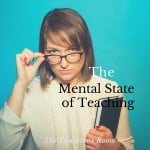“I mean even though I taught all of the standards last semester, but I don’t feel like my kids learned anything!” These were the words one of the teachers who I support as an Instructional Coach said to me as we sat in her classroom after school discussed all things teaching and learning. This wasn’t a new teacher, she mid career and brought a great energy to her class as she struggled to help them understand the importance of reading,writing and thinking. Week after week, I worked with her on all things teaching and learning so to hear her be so discouraged broke my heart.
Her despair came at the end of a particularly hard unit for the kids when a large amount of students couldn’t tell her what they learned. They most they seemed to do was to just to bubble in the answer on the unit assessment. As we talked over the dismal results, I could see her torment and despair. What do you do when you feel like kids are not learning? As I listened I thought back to my time in the classroom and when I experienced the same type of defeat–that almost made me turn in my teacher edition textbooks and leave education. Instead of giving her some mumbo jumbo of educational research from someone who had never experienced this type of defeat, I decided to give her my experience working in the now defunct Memphis City Schools.
Rewind to over thirteen years ago.
It was the end of my second year of teaching and as I sat and reflected on what had happened the last 180 days of school, I still overwhelmingly felt like my kids couldn’t articulate the major lessons of my class. Sure I had taught the standards, but when grades were calculated and lockers were cleaned out, what would my students actually say I taught them? Could they critically analyze text and connect it to their own experiences? Were they able to brag about the research they completed in their capstone project? I wasn’t sure. I knew they could pass a standardized exam, but to me a single test could not measure the amount of knowledge they retained from the year.
As I packed up my classroom and transitioned into the summer, this question nagged at me. I reviewed surveys that my students completed at the end of the year and there was one thing that was apparent. My students wanted more out of my class- specifically they wanted to discuss what was happening in the world. Now of course ninth graders are all a little bit more verbose, but as I looked at the open ended answers, students used phrases like the following to describe what they wanted to do more of…
” I want to talk about what happens in the world. I know we have to cover Oedipus Rex, but can we talk more about what we talk about.” –A. S.
“You made me write more then I’ve ever written in my life. Everything connected back to reading and writing! WHY?!?!?” –L.G.
It was not until the middle of June that I connected the colossal mistake that I had made in my classroom– I had focused more on students being prepared for our end of the year exam instead of the real “crust” of teaching English- reading, writing, speaking and listening. I had allowed my administrators/evaluators convince me that a score at the end of the year mattered when indeed it did not.
After mulling over my options I realized that I had to give my students the same experience as I had in high school. A curriculum focused on reading, writing, speaking and listening with a blatant disregard for any end of the year test.
As I began to work on the new school year unit plans, I dove into grade appropriate literature and activities to reinforce the standards for the students. I also planned new activities such as discussions and debates to help reinforce the lessons of the novel. I decided that in order to make my class “work” it would have to be non traditional and flexible enough to fit the varying needs of my students.
Fast forward to fourteen years later as I work with teachers in the capacity of an Instructional Coach. I always weigh my responsibility of helping teachers solve “real time” issues in the classroom and one of the biggest complaints I hear is that teachers are being made to “teach to the test”. When I work with teachers like the one from above, I always try to give them advice on what I learned many years ago.
1. Standards are important, but what’s more important is how we interpret them to students.
Take for example this sample of this standard from the ELA Common Core Standards:
Cite strong and thorough textual evidence to support analysis of what the text says explicitly as well as inferences drawn from the text.
This is a standard that seems boring, but the options are endless in an English/Language Arts classroom. When teaching students about genocide/holocaust, I encourage teachers to use a novel like Night by Elie Wiesel or Left to Tell by Immaculee Ibizaga to make kids not only think, but relate to their story. Using these texts, I would find some articles (non-fiction) from a reputable news source about the Rwandan Genocide/ Jewish Holocaust and make it a practice for students to read and find textual evidence that supports events from the book. In my classroom, my kids LOVED Left to Tell because teaching in an urban school they were surprised that there were (and still are) genocides happening to people of color. Constantly requiring students to read (and cite) textual evidence to analyze the events made them not only think, but figure out many of the inferences from the text.
When I used supplemental texts to bring home the point that genocide can happen anywhere, it caused students to discuss what they read and to have an opinion about world events.
2. Literature (non-fiction and fiction) should be the cornerstone of any ELA classroom. Currently there’s a push in urban classrooms to only read excerpts of stories or to stick to short stories so that there can be more time to test prep, but those practices don’t necessarily impart more knowledge with students. Instead I make it a point to find texts that will not only address the curriculum guide (fiction vs. non fiction) but will also make the kids want to read-regardless of their reading level(s).
Using a text like Left to Tell in a classroom was a good choice because many of the students in my class were boys and they loved blood and gore. So when they were able to see that the book we were reading was not just some random text, but a true story they were intrigued. For every unit I taught, I purposely found texts that made them think and react. For example, when students I first taught the book, Left to Tell, the kids all gave me a collective sigh as I told them all about the book. So I knew I’d have to come STRONG when actually presenting them with the text. I opened my unit with a video about the Rwandan Genocide and then a reading of chapter one when Immaculee is being hunted because she’s a Tutsi. My kids were blown away.
In addition to giving the kids great literature, I had to become creative on how they could access the text. So in my classroom, I allowed kids to access the text on their cell phones, I sent out links for kids to read the text online and I encouraged kids to use YouTube to access the audio version of the text. We are no longer in the age where every student must have a physical book. Instead we should embrace technology and allow them to access the book in ways that make them want to read.
3. Discussion is a great way to facilitate learning that goes deeper than a text can. So many times we’re told by administration to show growth and this thinking can lead to teachers (especially new ones) to kill the copy machine with worksheets. The reality is that if kids can discuss the work, they have a 70% chance of remembering the content. Content rich discussions are great, but also having kids working in groups, listening (and responding to) podcasts, creating products are all ways that can make students not only understand the text, but also facilitate great discussions in the classroom.
In my classroom, I always (long before Common Core) used text dependent questions that made students not only discuss the text, but also make those connections to their world. I also made sure that students were given the chance to work in groups and solve problems presented by the literature. I used protocols that asked students open ended questions and allowed them to interpret and analyze literature.
4. Writing about what you read is KING in the English/Language Arts classroom. My students understood that the priority skill learned in my class was writing. Students wrote and responded to a variety of prompts, discussion questions and reports during every class period. At the beginning of the year I always assigned a writing portfolio that focused on 6-8 major writings that emphasized the writing process more than a final grade on an assignment.
All of the assignments aligned to the units I planned on teaching and all of the assignments put a lot of emphasis on the pre-writing, drafting, revising and final product. Students were given not only time in class, but also I used products like Google Docs to help edit writing assignments with “real time” feedback. The writing portfolio along with all of the rewrites and drafts, was a major grade in my class so students didn’t have a choice on completing the assignments. If they happened to be failing, it was critical for them to either complete a missing writing assignment or revise one for a better grade. My students HATED all of the writing that we did in my class, but in reality the writing made students go back to the text and really LEARN the standards.
At the end of the year students were expected to have final, revised versions of all of their writings and they had to take the final writing assignments and get them professionally bound (think Office Depot) in a portfolio for less than $5 and that was their final exam. I still get students that come and see me and thank me for making them write-despite their complaints.
5. Test prep means nothing if I’ve done everything above. Every year I’ve focused more on the what the standards say and less about what’s going to be on the test and every year my students have better then the previous year. We literally don’t pull out any type of guide for the exams until about two weeks before the test. That’s all I can give the test, because in reality if my kids can read, write and think then the end of the year standardized tests is the least of our worries.
Of course now with teacher evaluations tied to standardized test scores, it’s difficult for teachers to not test prep with kids, but I honestly believe if we teach, the kids will perform to the best of their ability and growth will be evident. Remember no child remembers the standardized tests they took, the remember the teachers who taught them.






Leave a comment